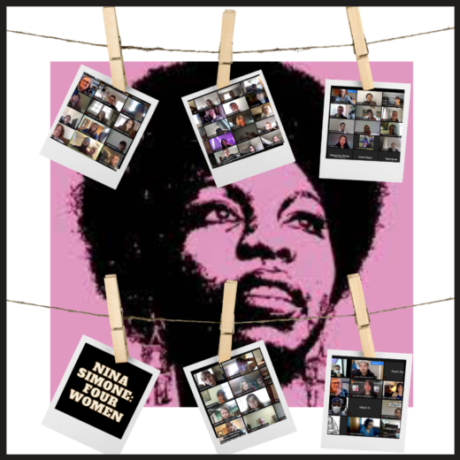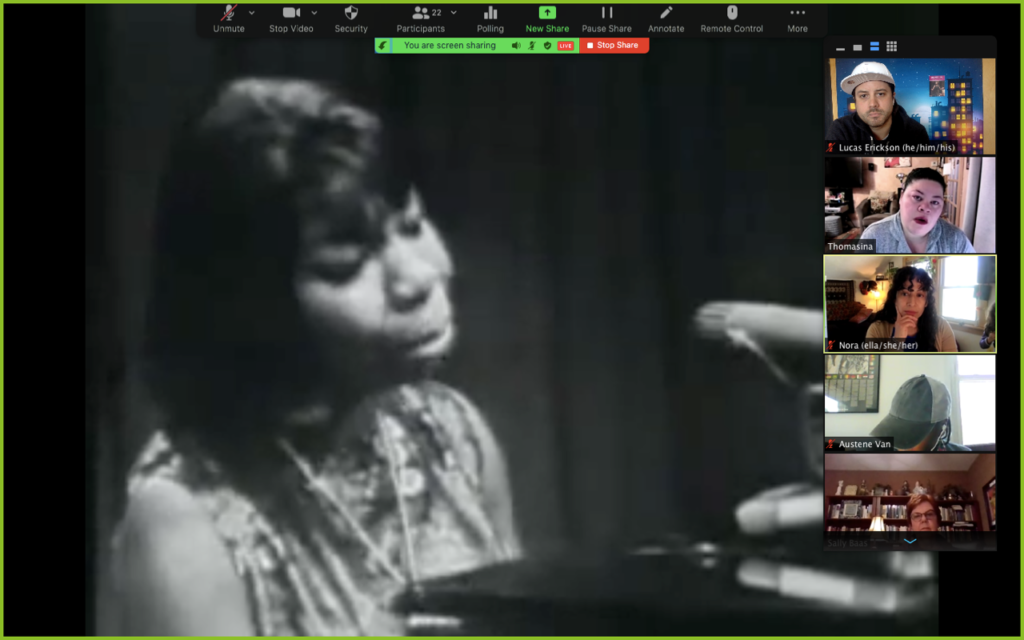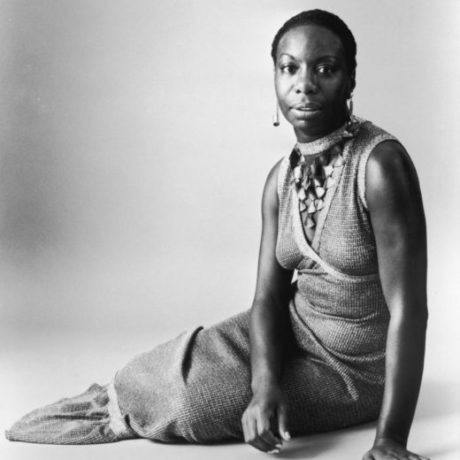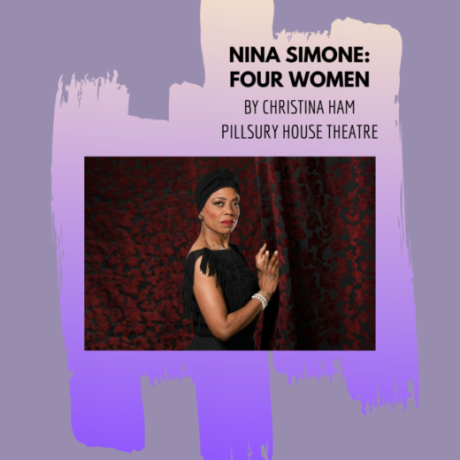On Stage involves local students in a closer look at Nina Simone”™s work around racialized violenceÂ
By JESSIE MERRIAM
Don’t tell me
I tell you
Me and my people just about due I”™ve been there so I know
They keep on saying “Go slow!” But that”™s just the trouble
—Nina Simone “Mississippi Goddam” 1963

“When we listen to Simone sing ”˜Mississippi Goddam”™–it could”™ve been written yesterday. Somebody needs to write a ”˜Minnesota Goddam”™ right now,” Twin Cities actress Thomasina Petrus declared to the group, gathered on the morning of April 1 to explore the play Nina Simone: Four Women and Simone”™s reverberating legacy.
This gathering was arranged by On Stage: Creating a Community Dialogue Around Live Theater, a Twin Cities nonprofit that brings the scripts of local plays to college classes and community centers and facilitates discussions with the aid of theater creators and educators. On April 1, Professor Jo Lee”™s “American Drama by Playwrights of Color” class at the University of Minnesota was joined by creators/ artist-activists Nora Montañes and Sun Mee Chomet, as well as Petrus, who performed in the 2016 Park Square Theatre staging of Nina Simone: Four Women in St. Paul. Lucas Erickson, On Stage”™s founder, facilitates every discussion.
Have you ever written a song? Have you been to a protest before? Is there a social issue in the world or something in your heart that activates you?
Christina Ham, an acclaimed Minnesota playwright, wrote the 2016 play that digs deeper into the way racialized violence catalyzed Nina Simone”™s evolution asÂ
an artist-activist. Pillsbury House Theatre planned to stage the play last year, but Covid postponement has pushed it to this fall or next spring.
The play follows Nina Simone on a fictional visit to the aftermath of a real event: the bombing of the 16th Street Baptist Church in Birmingham, Alabama, a prominent Black church and civil rights rallying place. In the bombed-out church, Ham brings the characters of Simone”™s 1965 composition “Four Women” to life and imagines Simone engaging with them on how to be heard as Black women in the midst of personal and widespread violence.
Petrus went over the backdrop of terrorism at that time in “Bombingham” and around the nation, and students were invited to consider the effects of fear on individual and social consciousness. The bombing occured in a year of great upheaval, and three months after the murder of Medgar Evers in Jackson Mississippi. These events had a profound effect on the real Nina Simone. She wrote the song “Mississippi Goddam” that year, vigorously lamenting the sluggish pace of change and the persistence of bias in society and the justice system.
This sluggish pace was at the forefront of the group”™s mind that April morning, day four of the Derek Chauvin trial. The students and On Stage facilitators took a moment of silence to acknowledge the fear, anxiety and fatigue conjured by the overlap of past and present events.
“Bring your forehead closer to the screen if you”™ve listened to music yet today,” Chomet invited the group. They talked about the way some songs stick in your head and inform the way you see your daily life. Then they discussed Nina Simone”™s evolving sense of her duty to “reflect the times and situations in which I find myself” through song.
They viewed Simone”™s 1962 performance of Gershwin”™s 1935 folk opera song “I Loves You Porgy,” to demonstrate her earlier style in subject matter as self-presentation. After viewing Simone”™s concert performances, Chomet guided the students to “rock the chat” and give impressions of what was conjured by this evolution to as, Petrus put it, Simone”™s “claiming being herself–claiming being a queen.”
Middle: Nina Simone in 1968 (NinaSimone.com),
Top right: Thomasina Petrus facilitating an On Stage discussion in 2019.
Bottom: Poster for Nina Simone: Four Women featuring Regina Williams.
Williams has played Nina from Philadelphia to Atlanta, and helps facilitate On Stage discussions of the play (coming 2021/2022 to Pillsbury House Theatre)
The women in the play grapple with the tragedy of the bombing, as riots erupt outside. Music becomes a core means of resistance in an era when women were denied speaking roles in the civil rights movement they were critical in organizing. Students listened to the song “Four Women,” and considered the influence of racism on conceptions of beauty and self-worth, the tension created by the perceived gaze of a hostile world.
Think of a moment where you felt exposed or where you doubted yourself; What did you need in that moment to help you feel supported and strong?
The play offers “four different lenses on Blackness and Black women”™s thoughts,” Petrus said. “How varied experiences are even within one”™s own community. This is what theater does that I love–it offers you the opportunity to realize how you thought one thing, but there are layers.” Those layers are revealed by every single element of the theatrical enterprise: the costumes, lighting, set, and stage management all reveal aspects of a character and a situation, Petrus emphasized, along with dialogue and physical action.
The jam-packed hour closed with a viewing of Simone”™s powerful 1964 performance of “Mississippi Goddam.”
“I”™ve had what I call the willies, I get chills every time to listen to these songs. 15 discussions – I listen to them a lot,” Erickson said in an interview afterward. Each semester, On Stage hosts 15 discussions of two different plays. In 2020 he started OnStage/OnLine to bring future local plays to virtual classrooms, to “stimulate an interest in live theater, examine the cultural context of a play, and of course, to have fun!”
“We just want to create some kind of ripple effect in their learning. Hard to measure, but it”™s there,” Erickson says. On Stage works with theaters to offer discounted tickets to participants so they can attend the performance post discussion. The plays have addressed such difficult issues as gender and racial inequity, LGBTQ discrimination, cultural diaspora and alienation and aging. The facilitators bring the plays alive through dynamic activities, encouraging the students to grapple with their themes and see theater as relevant and enriching.Â

“We open a can of worms and then leave,” Erickson admits. “Some educators have had to bow out. It”™s an intense time, with the trial,” Erickson says. But the hope, and feedback, has been that this forum offers a source of connection and deeper consideration.
Chomet closed this discussion with shout-outs to current musical artists lifting social justice causes. And a palpable energy, the sense of the power of theater for grappling with these issues.
Petrus”™ enthusiasm for the accessibility, depth, and power of theater is infectious: “Theater is one of the last arenas where adults can learn about each other in an environment where it”™s safe to ask the hard questions. Strangers can come together and really learn about each other.”
Find out more about On Stage at www.onstagemn.org. Follow Pillsbury House Theatre on social media for announcements about the play!Â













